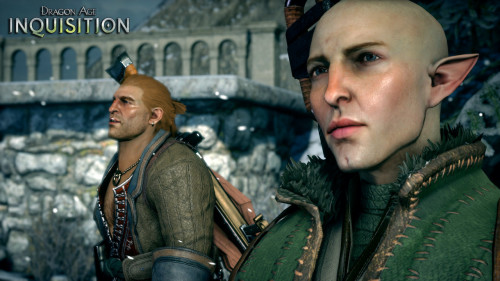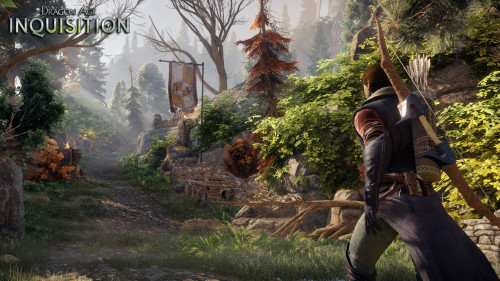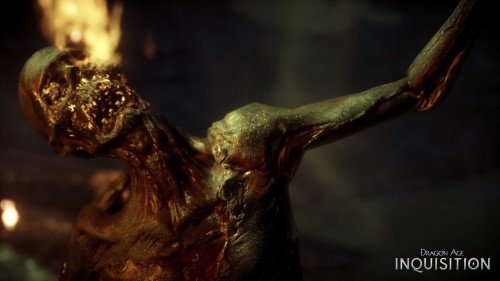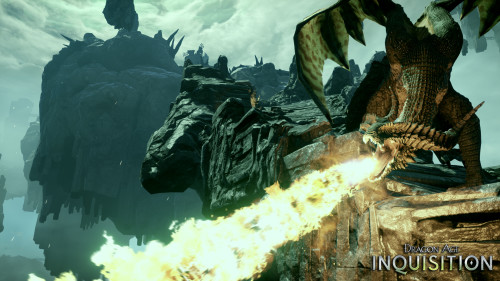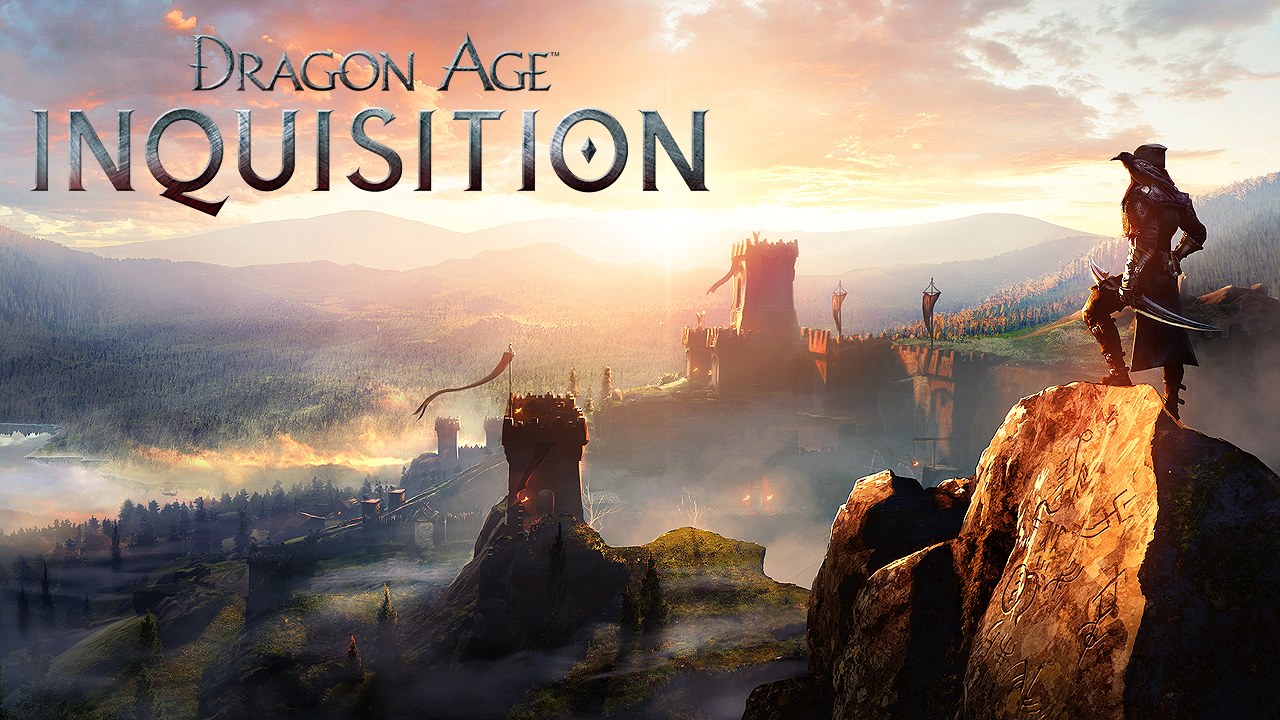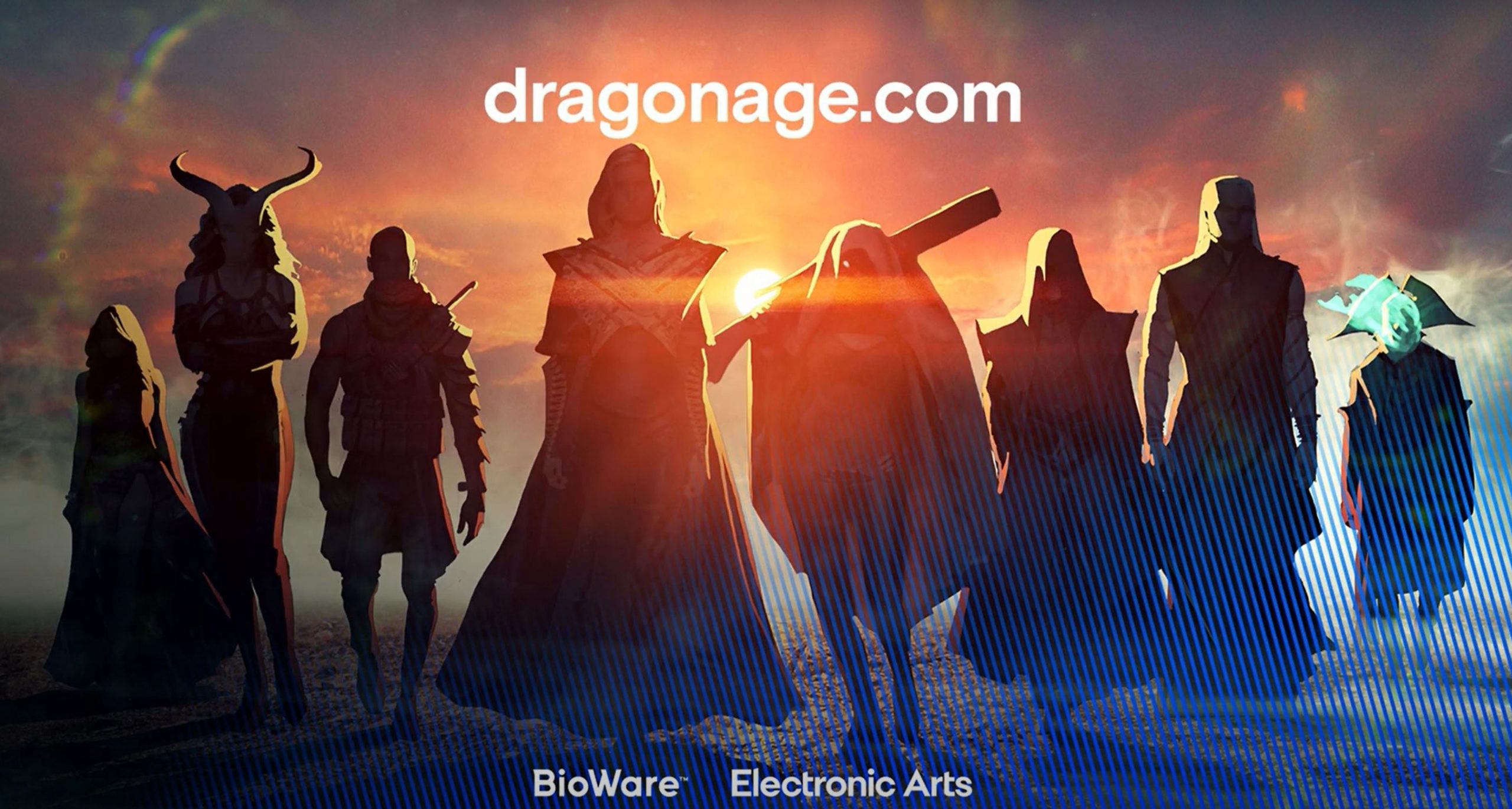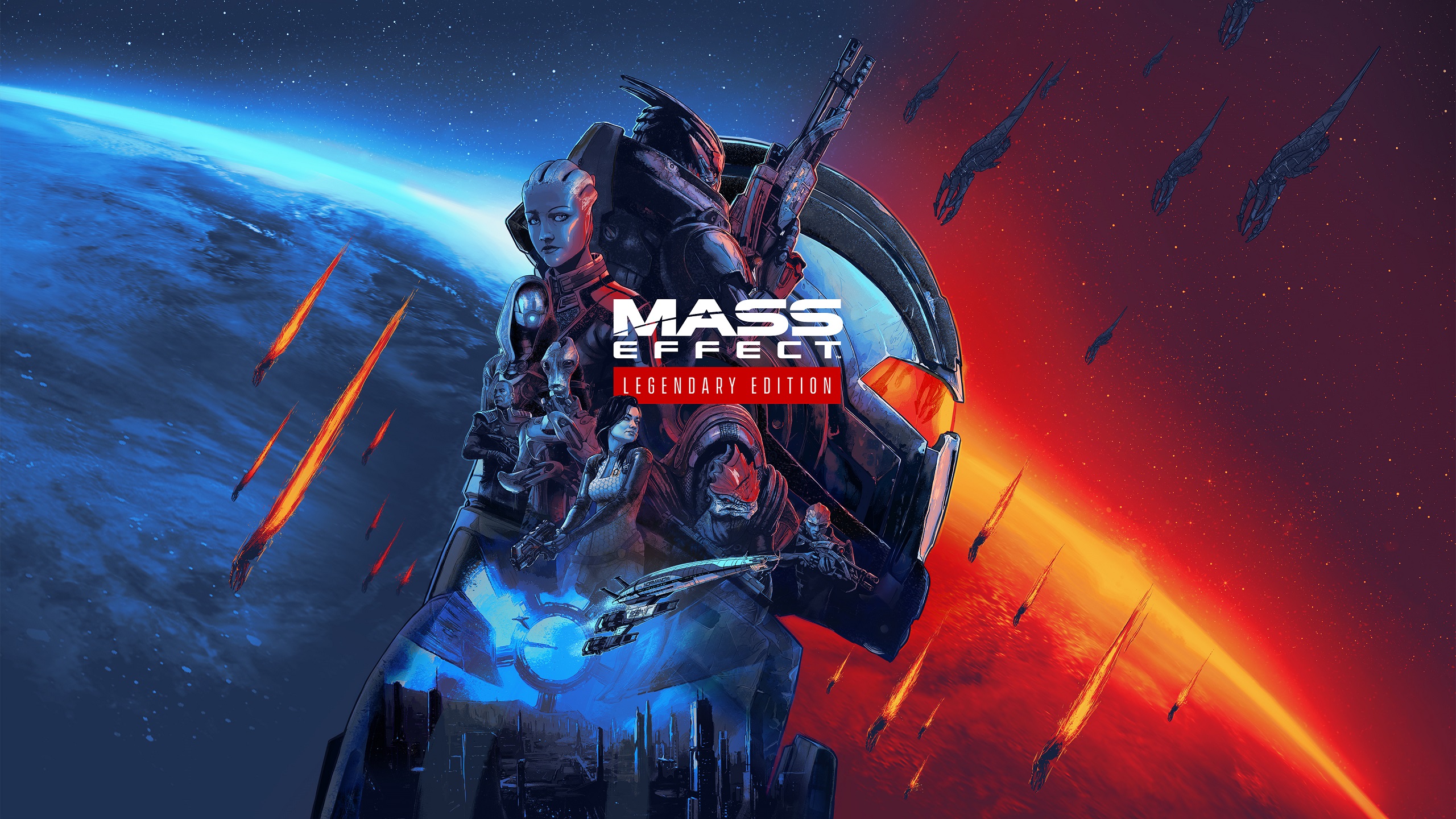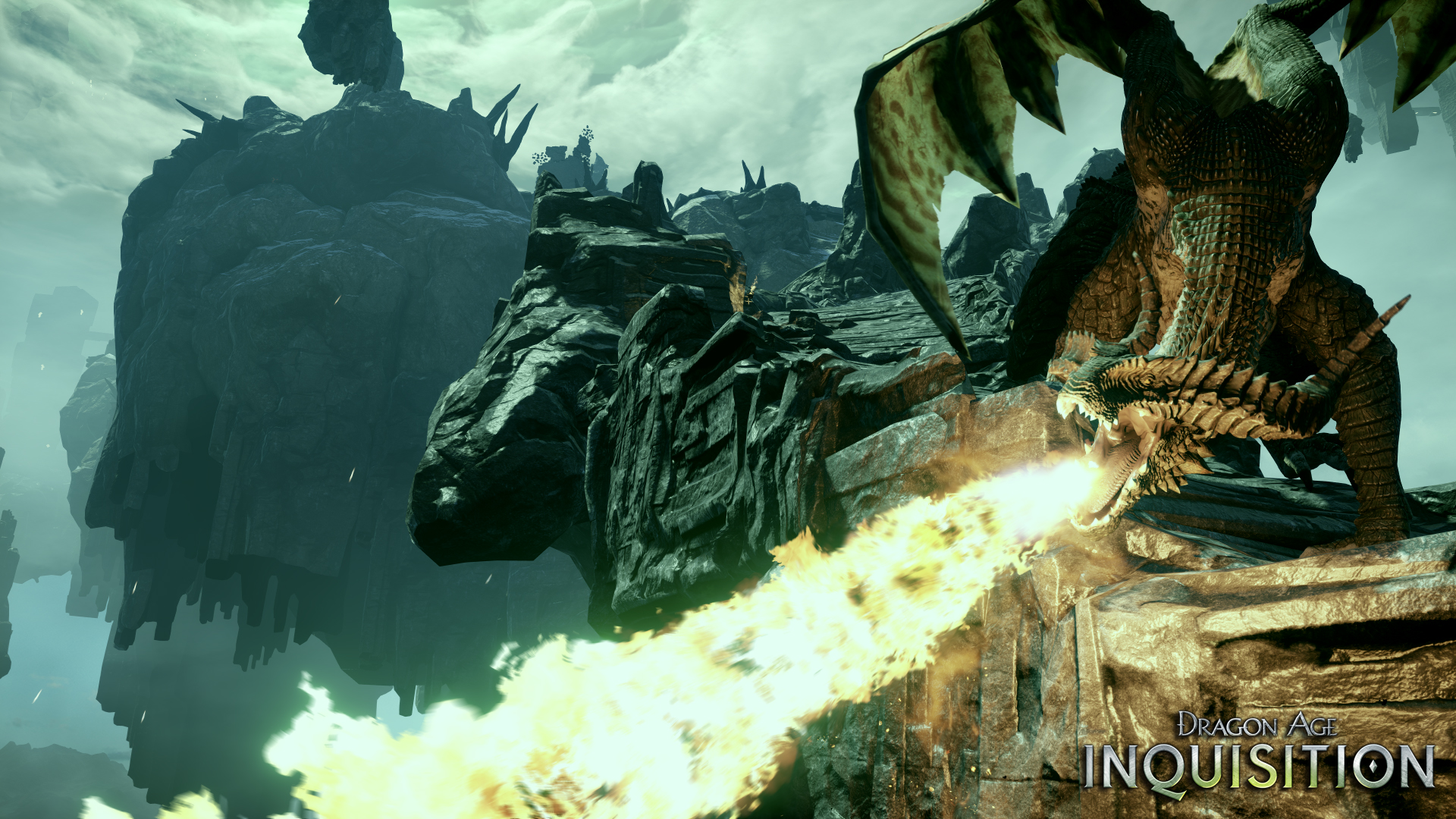
Dragon Age is a series with three mainline games. It’s…kind of a trilogy, I guess? Not like Mass Effect, but still connected, through characters and lore. And also unlike Mass Effect, Dragon Age‘s three games play borderline nothing like one another. It’s a bit crazy if you think about it; Origins is supposed to be a spiritual successor to Baldur’s Gate, enriched with isometric tactical gameplay and classic role playing. Dragon Age 2 is an action RPG, embracing unnecessary edginess and grittiness and worsening more or less…everything.
And now there’s Inquisition. Which has almost nothing from Origins, a handful of concepts from Dragon Age 2, but mostly a ton of its own stuff going on. Much of which resembles the design model of an MMO, Monster Hunter, and other grindy games. And I’ll say it right now; normally I hate that stuff. I hate grinding and fetch questing. Yet somehow, through all of that, I’ve enjoyed Inquisition more than the last two games. Weird.
Powered by Frostbite 3, Inquisition is modelled after a design philosophy that dumps the player in large open terrain, unlocked via the world map, with the freedom to explore and mingle as you please. It’s not open world like Elder Scrolls, where you have one massive location with little to no loading. No dynamic time or weather changes here either. Instead, it’s more like a handful of zones, discovered through progressing the story and unlocked via the numbered strength of your inquisition. Think Mass Effect 3‘s war asset points, only actually used for something.
The rock and a hard place for most players is going to be how open they are to the way these zones are designed. As said, it’s very much like an MMO. A lot of fetch quests, collect-em-all, trinket hunts, and other junk. Junk that is, to be perfectly honest, pretty damn fun. While I’ve soured on Elder Scrolls after the last two entries, Inquisition provides a bit more agency and wonder in its exploration. I’ve lost count of the amount of times I’ve discovered a mine, or tomb, or seen some odd looking vista on the horizon and felt that Tolkienite urge to wander off the path and explore the unknown. Even if a lot of that unknown is fluff, Inquisition does an impressive job of presenting that fluff with visual splendour and a sense of mystery and awe. Your journeys into the unkmnown almost always reward with a rare item, essential crafting materials, lore developments, and/or discovery of something truly spectacular, like an ancient dragon waiting to wreck you. At the very least most adventuring rewards with inquisition points, which as mentioned go towards unlocking new areas and progressing the story, and selecting upgrades within the inquisition order levelling trees.
The feedback loop is transparent, and Inquisition uses a lot of this carrot-on-a-stick stuff. Collect all the things to unlock the door, to receive an upgrade to your resistance, then collect more things to unlock the second door. Drip feed inquisition points for everything you do, working towards those little milestones. It’s not the upper echelon of game design, and will make-or-break for most people. But I do find this trickery is buried under enough good and presented convincing enough for it all to work oddly well.
Origins fans hoping for a full return to more tactical combat and rich character development will be disappointed. Again, like an MMO, Inquisition has you delegating commands, whether they be specials or basic attack cycles, in a pseudo-real time environment. Armour and barrier buffs are adopted from the Mass Effect series, and playstyle can be more or less arranged into three categories; warrior, ranged, and magic. You’ve options to tailor your character (and followers) through load-outs and upgrade trees related to their proficiencies, unlocking specials abilities and buffs. Diversity in builds did seem to be a bit lacking, at least for stat upgrades, most of the fun coming from equipment, like crafting specialised weapons with various enchantments suited for specific fights. Really, Inquisition seems even more regressive than Dragon Age 2 in a lot of ways, specifically with how those CRPG dice rolls have taken a back seat in character stat tweaking and the way skills are implemented in play.
Nonetheless, I’ve enjoyed what’s there. The combat is very simple but has just enough flexibility for satisfying real-time involvement, with counter specials and casting. BioWare is sitting in this weird grey zone though, where they probably should disregard trying so hard to appeal to original Dragon Age fans and go the whole hog into real time combat, because Inquisition benefits from none of the leftovers. And I’m talking about the tactical camera, which is BioWare’s attempt at classic CRPG isometric control that ultimately becomes baggage. Pausing to delegate commands is fine, but the utterly rubbish and inconsistent AI makes wrestling with the tactical camera to achieve true control and strategising just not worth it.
Story is perhaps Inquisition‘s weakest element, largely because it’s so all over the place in quality. To be perfectly honest the Dragon Age universe has struggled to sweep me up. Inquisition seems to have some of the best and worst. Speak to characters like Solas and he’ll explore philosophical meanderings on what it means to be a soul, the true existence of the Fade, and nature of subjective perception in a way that enriches the lore and universe. And then you have a main villain who is laughably unconvincing and unintimidating. Some quest arcs go through incredible journeys, with twists and revelations. Others fizzle out into the banal. Occasionally the game gives you narrative involvement that at least has the illusion of meaningfulness and control, such as casting judgement from your inquisitors throne. Other times the choices seem to all lead down the same path and offer no real distinction in player character personality, or worse a response wrong to what the text and tone implied. Again regressive; if the CRPG is all about choice and consequence in narrative, BioWare continues to pull back your level of involvement.
Narratively Inquisition is tragically inconsistent, which is an issue I’ve had with all three games in the series. Origins has some dreadful stretches (hello, Fade) that make you wonder how they made the cut, as does Dragon Age 2. However, Inquisition gets away with a lot of it’s boring patches by having them take place in the aforementioned open landmasses; if you’re enjoying the arguably aimless wandering and adventuring, seeing the sights and fighting the bad monsters at your own pace, the dull narrative hook that lead you there in the first place is quickly forgotten in favour of better things.
Inquisition finds itself in a strange nook. There’s much to be criticised and the former required more work to be refined. Maybe folk more invested in the Dragon Age universe will find the narrative more compelling than I did. It does have its highs, even when something so important like an threatening, believable antagonist is so lackluster. BioWare really, really needs to branch away from this ancient evil awakens, you are the chosen one style of narrative. Inquisition does seem to recognise this and challenges validity, but it is what it is and after several games following a similar style the hook has become tiring.
And as you play it’s very easy to that have moment of clarity, awakening even; “Hang on…I’m not really accomplishing much!” An awareness of that carrot-on-a-stick desgin and how it might just be fooling you into fun. But for most of the adventure I was able to sink right in and enjoy the ride. Consider me a fool, and Dragon Age: Inquisition a whole lot of fun.
Great sense of adventure Beautiful presentation Plenty to do
Poor AI and tactical camera Mixed narrative MMO-style design may be unappealing

